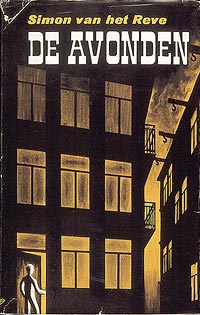Related Research Articles

Gerard Kornelis van het Reve was a Dutch writer. He started writing as Simon Gerard van het Reve and adopted the shorter Gerard Reve[ˈɣeːrɑrt ˈreːvə] in 1973. Together with Willem Frederik Hermans and Harry Mulisch, he is considered one of the "Great Three" of Dutch post-war literature. His 1981 novel De vierde man was the basis for Paul Verhoeven's 1983 film.

Tom Lanoye was born 27 August 1958 in the Belgian city Sint Niklaas. He is a novelist, poet, columnist, screenwriter and playwright. He is one of the most widely read and honoured authors in his language area, and makes regular appearances at all the major European theatre festivals.

Hossein Sadjadi Ghaemmaghami Farahani (Persian: حسین سجادی قائممقامی فراهانی, better known by his pen name Kader Abdolah, is a Persian–Dutch writer, poet and columnist. His books, written in Dutch, often contain Persian literary themes. He regularly appears on Dutch TV as well.

The Gouden Griffel is an award given to authors of children's or teenagers' literature in the Netherlands.
The Golden Harp(Dutch: Gouden Harp) is awarded annually to Dutch musicians for their entire oeuvre. Golden Harps have been awarded 42 times. 149 different persons or (musical) groups have had the honour of receiving the award which is considered to be one of the most important prizes in Dutch music.

Guus Kuijer is a Dutch author. He wrote books for children and adults, and is best known for the Madelief series of children's books. For his career contribution to "children's and young adult literature in the broadest sense" he won the Astrid Lindgren Memorial Award from the Swedish Arts Council in 2012, the biggest prize in children's literature. As a children's writer he was one of five finalists for the biennial, international Hans Christian Andersen Award in 2008.
Marinus Franciscus Johannes "Marijn" Backer is a Dutch educator, poet, and writer.
In the Netherlands, the Boekenweek is an annual "week" of ten days dedicated to Dutch literature. It has been held in March annually since 1932. Each Boekenweek has a theme. The beginning of the Boekenweek is marked by the Boekenbal, a gathering that is attended by writers and publishers. Events are held across the country during the Boekenweek, such as book signing sessions, literary festivals and debates.
The Golden Book-Owl is a Belgian prize for original Dutch language literature. Originally it was named Golden Owl. It has been awarded annually since 1995.

The Evenings: A Winter's Tale is a debut novel by Dutch author Gerard Reve released in November 1947 under the pseudonym "Simon van het Reve". The full title of the book was De avonden: Een winterverhaal.
De vierde man is a 1981 novel by Dutch author Gerard Reve, the basis for the film of the same name by Paul Verhoeven. Among Reve's works, it stands out as one of only a few novels to have a heterosexual theme.

De puinhopen van acht jaar Paars is a political non-fiction book released by the Dutch political commentator and aspiring lawmaker Pim Fortuyn in 2002, two months prior to his assassination. In the book, Fortuyn sharply criticizes the then ruling "Purple" coalition government and its direct predecessor on nearly all areas of their policies.

Johanna Rutgera 'Joke' van Leeuwen is a Dutch author, illustrator, and cabaret performer.
The Maand van het Spannende Boek (June) is a Dutch theme month to promote literary genres of "exciting books" and is organized by the Collectieve Propaganda van het Nederlandse Boek.

As of 2018, Wolters Kluwer ranks as the Dutch biggest publisher of books in terms of revenue. Other notable Dutch houses include Brill and Elsevier.

Anton Quintana, pseudonym of Anton Adolf Kuyten, was a Dutch writer.

Peter van Gestel was a Dutch writer.
In the Netherlands, the Vlag en Wimpel award is an honourable mention awarded by either the jury of the Gouden Griffel and Zilveren Griffel awards or the jury of the Gouden Penseel and Zilveren Penseel awards. The award is organised by the Collectieve Propaganda van het Nederlandse Boek.

Jan Paul Schutten is a Dutch writer of children's literature.
References
- ↑ Minnaard, Liesbeth (2009). New Germans, New Dutch: Literary Interventions. Amsterdam UP. p. 253. ISBN 9789089640284 . Retrieved 12 May 2012.
- ↑ "Tom Lanoye schrijft Nederlands boekenweekgeschenk". Gazet van Antwerpen (in Dutch). 12 April 2011. Retrieved 12 May 2012.
- ↑ "Genomineerden Gouden Strop bekend". de Volkskrant (in Dutch). 8 May 2012. Retrieved 12 May 2012.
- ↑ Hermans, W.F. (23 April 2012). "Gratis Nieuws - Nederlands Dagblad". Nederlands Dagblad (in Dutch). Retrieved 12 May 2012.
- 1 2 3 Bergh, Thomas van den (15 March 2006). "Boekenweekgeschenk: Hoe Reve week voor Knap". Elsevier . Retrieved 31 May 2012.
- 1 2 3 4 5 6 Voorden, Rene van der; Hein Hoffman (2000–2001). "Het boekenweekgeschenk van Reve". Geschiedenis 24 . Retrieved 31 May 2012.
- 1 2 3 Andeweg, Agnes (2011). Griezelig Gewoon: Gotieke verschijningen in Nederlandse Romans, 1980-1995 (in Dutch). Amsterdam UP. p. 53. ISBN 9789089643087.
- ↑ Willems, Ans (8 March 2008). "De kunst van kitsch". Nader tot Reve. Retrieved 31 May 2012.
His melancholy speaks its own language. It is the source of his story. He is a clown who cries and laughs. I have often heard his voice. His greatest weapon is the word. A man who no longer expects much, but is driven on by hope and love.
- ↑ Koopmans, Joop W.; Huussen, A. H. (2007). Historical Dictionary of the Netherlands. Scarecrow. p. 191. ISBN 9780810856271 . Retrieved 12 May 2012.
- ↑ "Nederlandse Boekenweek haalt oude koeien uit de sloot". De Standaard . 14 March 2005. Retrieved 31 May 2012.